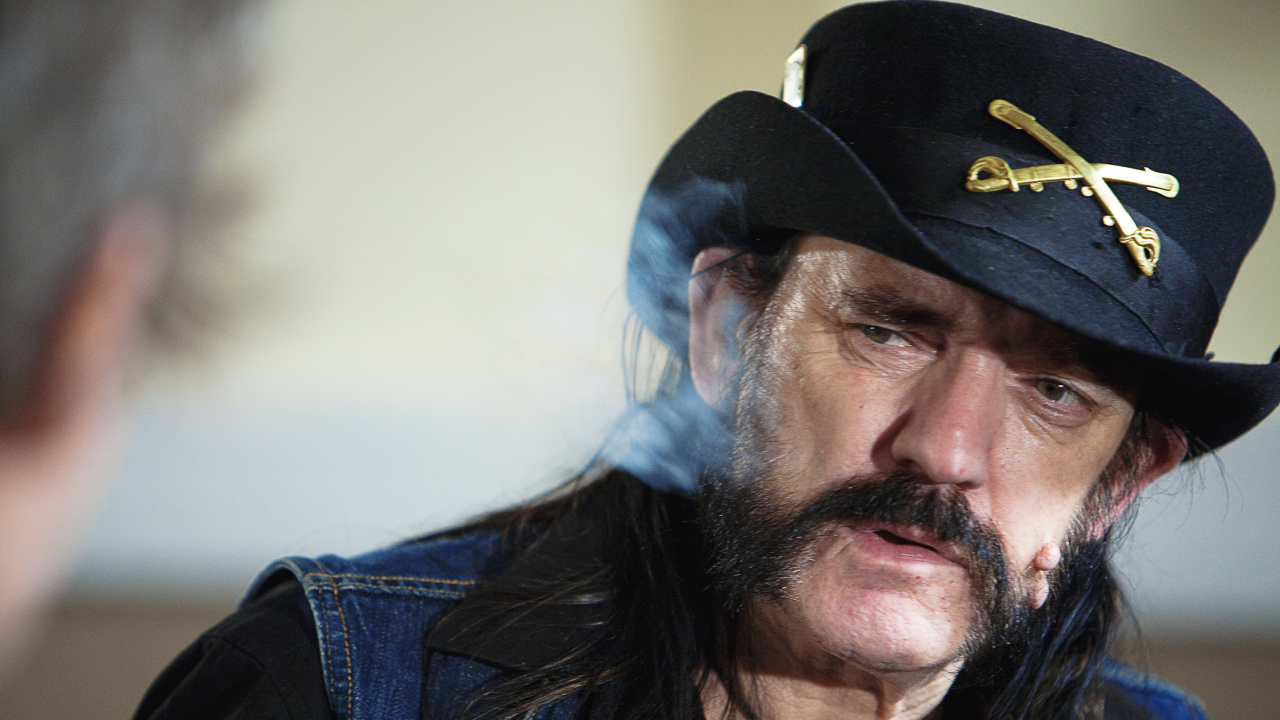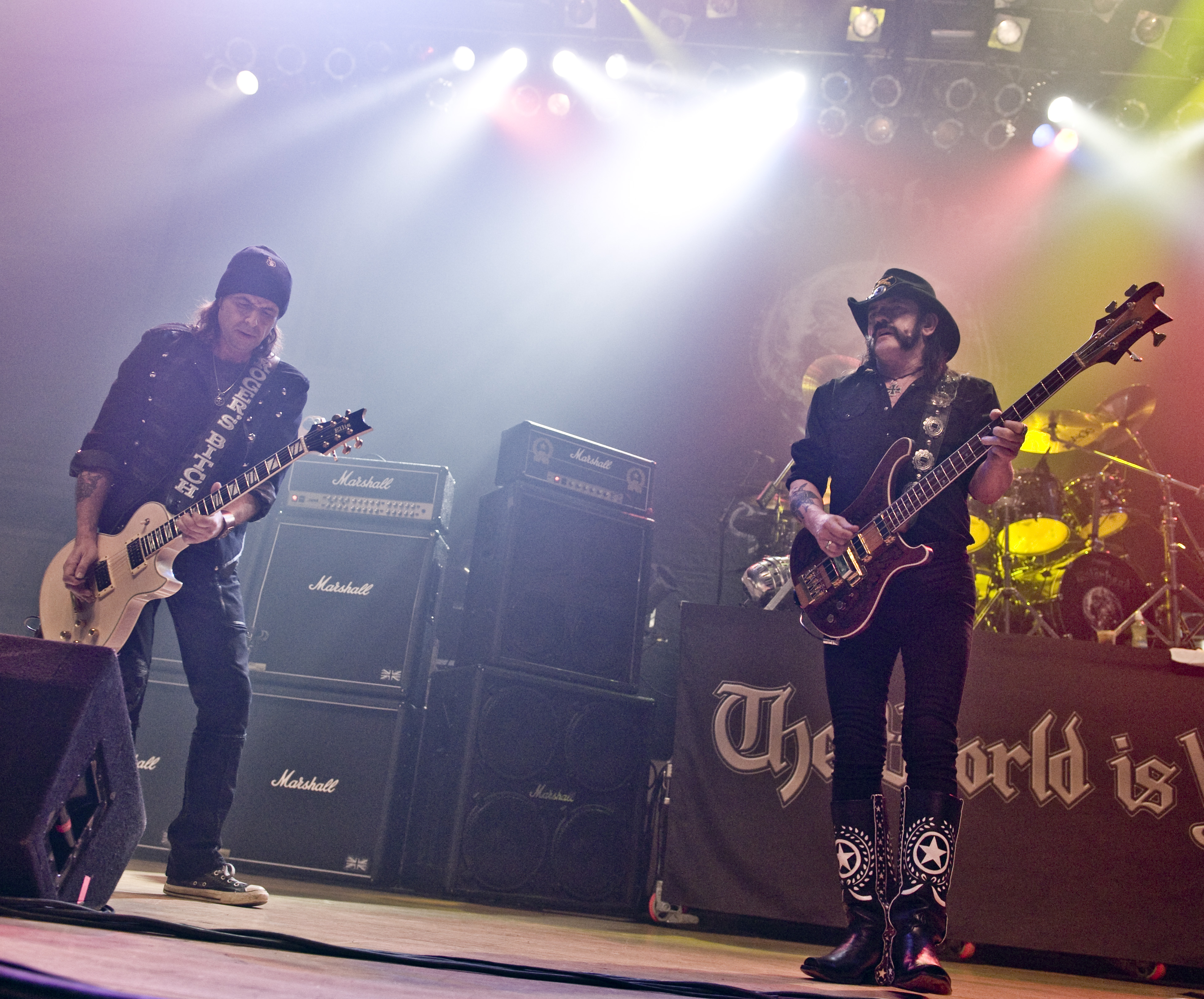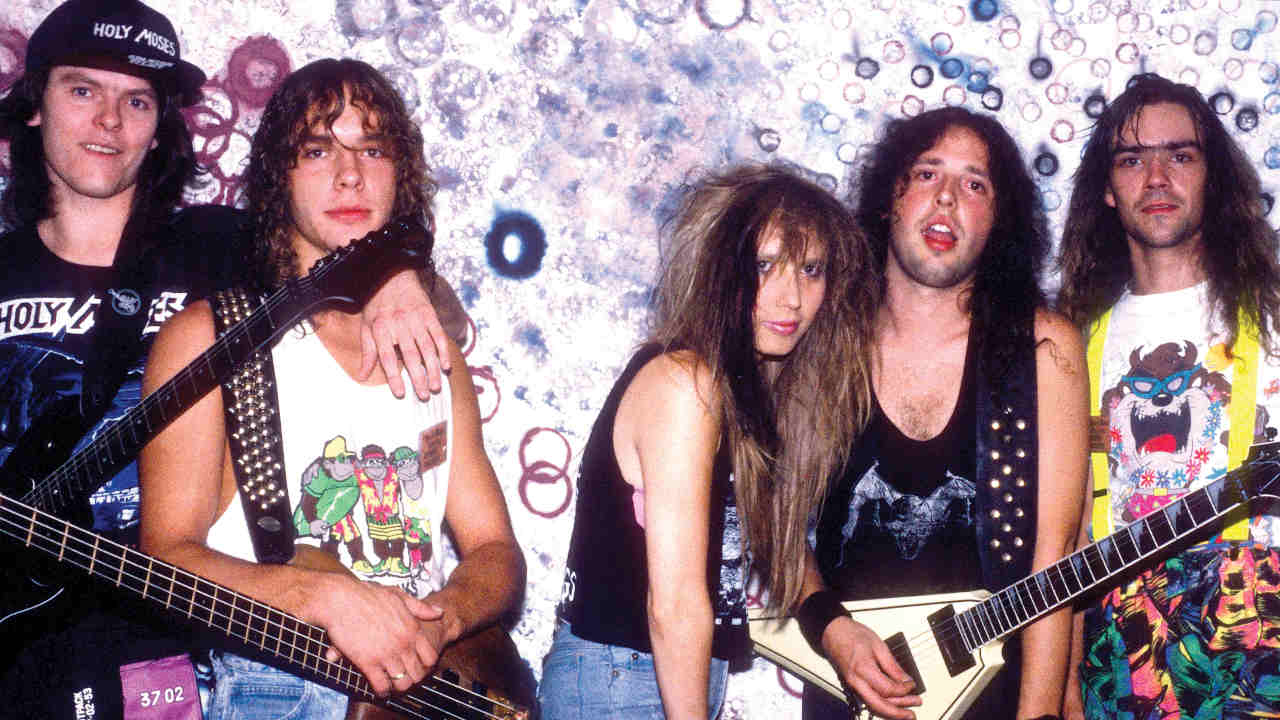Motorhead: "I joined the mile high club under a blanket, very nice"
With 40 years of hitting the road under his belt, Lemmy's literally seen and done it all. We caught up with the crown prince of rock and roll for some jack, coke, and tales of life on the road

Select the newsletters you’d like to receive. Then, add your email to sign up.
You are now subscribed
Your newsletter sign-up was successful
Want to add more newsletters?

Every Friday
Louder
Louder’s weekly newsletter is jam-packed with the team’s personal highlights from the last seven days, including features, breaking news, reviews and tons of juicy exclusives from the world of alternative music.

Every Friday
Classic Rock
The Classic Rock newsletter is an essential read for the discerning rock fan. Every week we bring you the news, reviews and the very best features and interviews from our extensive archive. Written by rock fans for rock fans.

Every Friday
Metal Hammer
For the last four decades Metal Hammer has been the world’s greatest metal magazine. Created by metalheads for metalheads, ‘Hammer takes you behind the scenes, closer to the action, and nearer to the bands that you love the most.

Every Friday
Prog
The Prog newsletter brings you the very best of Prog Magazine and our website, every Friday. We'll deliver you the very latest news from the Prog universe, informative features and archive material from Prog’s impressive vault.
Outside the backstage area of London’s Garage, a horde of Motörhead fans are clutching various items of memorabilia while inside Lemmy is preparing to make his European debut with The Head Cats, a rockabilly side project featuring Mr Kilminster, the legendary Stray Cat Slim Jim Phantom (drums) and guitarist Danny B. Harvey.
With decades of fan/stalker experience under his bullet belt, Lemmy has surrounded himself with a tight entourage including Ute, his glacially Teutonic manager who convinces the autograph hunters to come back after the show with the exception of one who is anxious to get his arm signed for a tattoo.
In the dressing room we find the gangly frame of an über-friendly Slim Jim spread across a couch which has seen better nights. Sat at the back under a haze of smoke is Lemmy, who looks at home in these cramped surroundings. And why shouldn’t he? The room contains everything he would need in the event of nuclear attack including his beloved books, several packs of Marlboros, Jack Daniel’s, a bucket of ice and a fridge full of mixers.
Even with his rheumy eyes and pasty features, Lemmy is someone we all want to be. His very existence affirms that all of us made the right choice when we sold our souls to rock’n’roll.
“Here, make yourself useful and fill this up with ice,” he growls and thrusts a cup in your interviewer’s face. The idea of this press junket was to promote Motörhead’s forthcoming tour of the UK and the release of latest album The World Is Yours, but Lemmy seems uninterested in doing either. “I can’t see the point of comparing one live album to the other, or to our studio albums,” he sighs. Even the mention of No Sleep ’Til Hammersmith being an iconic album fails to impress: “It may have been iconic but it wasn’t the best. People just remember it because it was one of a few live albums from a metal band that went straight in at number one.”
He pauses thoughtfully, taking a long drag. “It went out the week after at 137.” The last sentence is serenaded by a long, asthmatic cackle that’s halted by a slug of JD.
Motörhead have long since crossed the line where they need to promote themselves and Lemmy is one of a rare breed in the music industry who to, quote the title of the latest Head Cat album, Walks The Walk and Talks The Talk as he demonstrates in our interview:
The latest news, features and interviews direct to your inbox, from the global home of alternative music.
Hammer: Can you see a connection between 50s rock’n’roll, rockabilly and the music of Motörhead?
Lemmy: “You can’t hear it but the people who started rock’n’roll had the same mindset as the people who do what we do now. It’s like defiance, rebellion for the sake of it. It’s the same message: fuck you!”
Hammer: You once said that there was rebellion in the 50s, 60s and 70s but now it’s long gone.
Lemmy: “Sure. Nowadays everybody seems to be kissing the government’s ass, don’t they?”
Hammer: What sort of things make you want to rebel?
Lemmy: “Mostly injustice. I’m always writing songs that are anti-war… I’m always bitching about something ha ha ha!”
Hammer: Is The Head Cat project about your love of the music and to keep things fresh or are you just bored with Motörhead?
Lemmy: “It’s just fun to do and fits around my time with Motörhead.”
Hammer: What’s the difference between going onstage with The Head Cat and Motörhead?
Lemmy: “It’s a lot smaller innit? Apart from that it’s the same.”

Hammer: You don’t have a ritual to get into the right frame of mind?
Lemmy: “No, that’s for bands like Coldplay, not for people like me. I’m always in THAT frame of mind.”
Hammer: How have your fans responded to this project?
Lemmy: “Some like it, some don’t. We ain’t just rockabilly. We play songs by The Beatles, Buddy Holly and Johnny Kidd & The Pirates too.”
Hammer: It must be frustrating that some fans can’t be open-minded. When someone asked you how could Brian May be a Motörhead fan, your response was ‘Why can’t you think of two different kinds of music at the same time?’
Lemmy: “Exactly! Why do you have to fit into their rules? There’s only two kinds of music: music you like and music you don’t like.”
Hammer: The last time Hammer saw Motörhead was at Rock in Rio. How was the show for you?
Lemmy: “It was alright. I couldn’t really hear very well because all I had was drums on my monitors.”
Hammer: It must’ve been better than your Bloodstock show?
Lemmy: “Yeah, that was a fucking disaster! I don’t know why we cut it short, there must have been a reason. We only cut Overkill.”
Hammer: Brazilians are huge fans of heavy metal. Do you feel any connection with the country?
Lemmy: “I like Brazil, most bands I know do. I guess we have more of a connection because we have two Brazilians in our crew.”
Hammer: Is it true that Brazilian audiences not only sing along to the lyrics but also to the riffs?
Lemmy: “Yeah, and they do football chants and stick your name in ’em.”
Hammer: Was Going To Brazil your homage to the country?
Lemmy: “It seemed like a good idea at the time. I wrote it on the plane going there.”
Hammer: ‘Watching all the road crew attacking little girls?’ Did that happen?
Lemmy: “Yeah, on the flight. It wasn’t so much an attack, more a schmooze.”
Hammer: ‘Joined the Mile High club flying round the world’. Fact?
Lemmy: “I was in the club before that. It was from London to Sweden. No hang on, from here to the States. Under a blanket, very nice.”
Hammer: I was going to say… London to Sweden is short flight.
Lemmy: “You can still do it ha ha!”
Hammer: Out of all your bands, who has been the most notorious for bad behaviour?
Lemmy: “Probably Motörhead, because we’ve had longer to do it.”
Hammer: You seem to be more of an observer than a participant…
Lemmy: “I suppose so now… but I used to be the chief participant.”
Hammer: I remember when you played the Roundhouse in the 70s, it was chaos. People were snorting lines off mirrors ripped off the dressing room wall… groupies were sprawled all over the place… all the usual hedonism.
Lemmy: “I know, it was fucking brilliant! I think I went home with three chicks that night.”

Hammer: Who was the main protagonist: you, Eddie or Philthy?
Lemmy: “Phil was right in the middle of it all. That’s why he kept breaking bits of his body off; he was always in some sort of plaster cast.”
Hammer: Is there any carnage you’ve created recently?
Lemmy: “We did over Testament during a tour with Judas Priest. First Mikkey came out dressed up as a Mexican with one of those mules where your legs are the mule’s legs, wearing a Sombrero and a huge moustache. Then Phil came out on a real horse wearing a pink dress and a pink wig with this chick full of tranquilisers leading the horse. I came up behind dressed as an Arab wearing a towel over my head and shades. Chuck Billy went up the mic and said, ‘I’ll never top this set!’”
Hammer: Tell us about your on-the-road mayhem.
Lemmy: “There’s been disasters and there’s been disasters. When the PA’s fallen over we haven’t always pushed it. I’ve seen it all before, it’s no fun doing something you’ve already done. You should talk to the crew. They get up to more than we do and have better memories.”
Hammer: This summer saw the tragic death of former guitarist Wurzel. Is there anything you’d like to say about that?
Lemmy: “No, he was a good friend and now he’s dead. What do you want me to say? Is this for the Daily Mirror? How did you feel when you were shot, Mr President? That question isn’t worth answering, it’s personal stuff.
Hammer: Do you think about death?
Lemmy: “No, why would you spend time worrying about something that’s fucking inevitable? You just have to adopt, adapt and improve.”
Hammer: You do a lot of cameo appearances with other artists, most recently as a chauffeur in the Foo Fighters’ White Limo DVD. Is this for cash or creativity?
Lemmy: “I didn’t ask for money on the White Limo shoot. Dave’s great. He has a shirt that says ‘Fuck Elvis, Lemmy Is King of Rock’n’Roll’.”
Hammer: Do you know about the Lou Reed/Metallica collaboration?
Lemmy: “Yeah, Lars was telling me about it. It’s sounds strange to me. The main thing is if they like it. It’s where they come from, the Lou Reed era. They not old enough to have their roots in the original rock’n’roll. That’s their version of The Head Cat I suppose.”
Hammer: Who could you see Motörhead collaborating with?
Lemmy: “Dolly Parton ha ha ha!”
Hammer: At last you’ve been honoured with your own movie. What was it like watching your life on the big screen?
Lemmy: “I’m used to the idea now. It was all right I didn’t have to get out of the theatre before the lights went on. They did a good job.”
Hammer: What was it like hearing your peers being complimentary about you?
Lemmy: “It was flattering; they didn’t put anyone in saying ‘He’s a cunt.’ I don’t know if there was any.”
Hammer: One of the most touching scenes was you with your son…
Lemmy: “The film crew turned up one day and Paul just happened to be there. Nothing was rehearsed.”
Hammer: Phil Campbell was upset the band weren’t featured more…
Lemmy: “Did he expect a Motörhead film? It was Lemmy – The Movie.”
Hammer: Do you think Phil and Mikkey will always be regarded as the new boys because you are the only original member of the band?
Lemmy: “Yeah, but I’ll also always be the oldest member too!”
Hammer: Do you ever wish you could get away from it all and do something in total anonymity?
Lemmy: “That’s never going to happen is it? I am who I am and whatever I do, it’s me doing it. I can handle that, so you guys will have to cope with it too.”
Hammer: So there are more advantages than disadvantages in being famous?
Lemmy: “Well of course! More people buy your shit.”
This article originally appeared in Metal Hammer #225.
To hear the best ten songs covered by Motorhead, then click the link below.
Pete Makowski joined Sounds music weekly aged 15 as a messenger boy, and was soon reviewing albums and doing interviews with his favourite bands. He also wrote for Kerrang!, Soundcheck, Metal Hammer and This Is Rock, and was a press officer for Black Sabbath, Hawkwind, Motörhead, the New York Dolls and more. Sounds Editor Geoff Barton introduced Makowski to photographer Ross Halfin with the words, “You’ll be bad for each other,” creating a partnership that spanned three decades. Halfin and Makowski worked on dozens of articles for Classic Rock in the 00-10s, bringing back stories that crackled with humour and insight. Pete died in November 2021.

